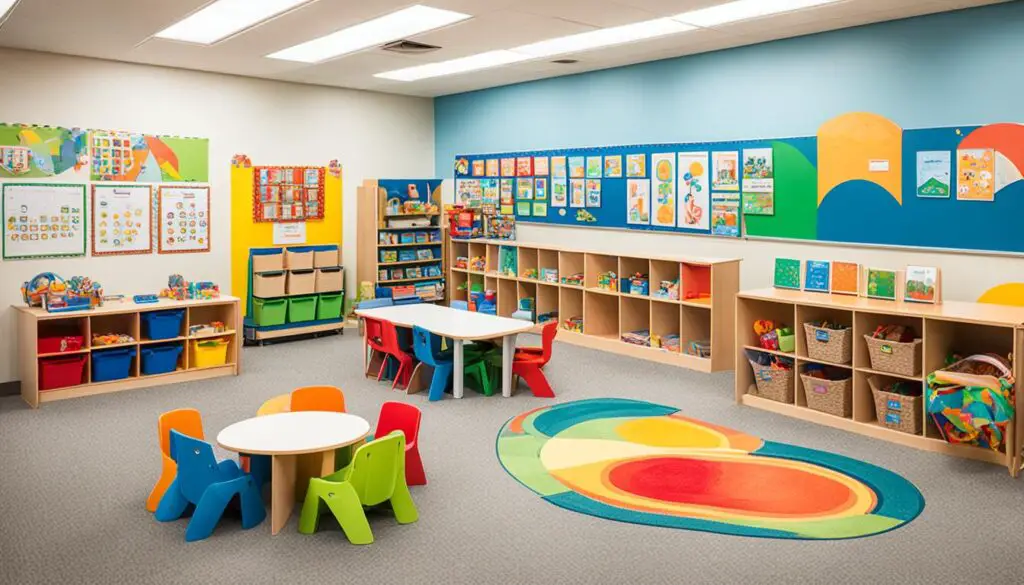
Exploring Early Education Degrees: Options and Opportunities
Early education degrees offer a world of possibilities for those passionate about shaping young minds and making a difference in the field of education. In this article, I will guide you through the diverse options available for early education degrees, and shed light on the endless opportunities they present.
Are you ready to embark on a journey that combines your love for teaching with the chance to make a lasting impact on the lives of young children? Let’s dive into the various paths and opportunities that early education degrees can offer.
Key Takeaways:
- Early education degrees provide numerous opportunities for working with young children and shaping their future.
- Types of early education degrees include associate’s, bachelor’s, and master’s degrees.
- Pursuing an early education degree opens doors to a wide range of rewarding career options in preschools, childcare centers, and educational institutions.
- Advantages of obtaining an early education degree include the ability to positively impact the development of young children and opportunities for professional growth.
- The demand for qualified early education professionals is expected to continue growing, creating a promising job market.
Types of Early Education Degrees
When it comes to pursuing a career in early childhood education, there are several types of degrees that can pave the way to a fulfilling profession. These degrees not only provide individuals with the necessary knowledge and skills but also offer opportunities for specialization and professional growth. Let’s explore the different types of degrees available in early education:
1. Associate’s Degree
An associate’s degree in early childhood education is a great starting point for individuals who want to work in preschools, childcare centers, or as teacher assistants. This degree program typically takes around two years to complete and provides a solid foundation in child development, curriculum planning, and teaching strategies. Graduates with an associate’s degree can make a significant impact on young children’s lives and contribute to their early development.
2. Bachelor’s Degree
A bachelor’s degree in early childhood education delves deeper into various aspects of child development, educational psychology, and teaching methodologies. This degree program provides a comprehensive understanding of the principles and theories that shape early education. With a bachelor’s degree, graduates can pursue careers as lead preschool teachers, curriculum developers, program coordinators, and even administrators in early childhood education settings.
3. Master’s Degree
For those seeking advanced study opportunities in early childhood education, a master’s degree is the ideal choice. With a master’s degree, educators can specialize in specific areas of early childhood development, such as special education, infant and toddler education, or early literacy. This degree equips professionals with the knowledge and skills needed to take on leadership positions in the field, such as educational consultants, researchers, or college-level instructors.
These early education degrees provide individuals with the necessary tools to make a lasting impact on young children’s lives. Whether you choose to start with an associate’s degree and work your way up or aim for a master’s degree, each level of education offers unique opportunities for personal growth and professional success.

Career Opportunities in Early Education
With an early education degree, individuals can pursue various career opportunities. Graduates with an associate’s degree can work as preschool teachers, teacher assistants, or childcare workers. Those with a bachelor’s degree can become lead preschool teachers, curriculum developers, program coordinators, or administrators in early childhood education settings. A master’s degree opens up opportunities for positions such as educational consultant, researcher, or college-level instructor in early childhood education. There is a growing demand for qualified early education professionals, and job prospects in this field are expected to continue to grow.

Early education degrees offer a wide range of career paths that cater to individuals with different interests and skill sets. Whether you aspire to be in the classroom, shaping young minds as a teacher, or prefer to work behind the scenes developing curriculum and programs, there are career options available to match your goals. The demand for early education professionals remains strong, making it a field with promising job prospects.
“In the early education field, there is a deep sense of fulfillment in knowing that you are making a difference in a child’s life. It’s a rewarding career that allows you to create a positive impact during a crucial stage of development.” – Sarah Johnson, Preschool Teacher
Early childhood education is a dynamic field that continues to evolve, with an increased recognition of the importance of quality education during the early years. As a result, the demand for skilled professionals in this field is on the rise. According to the Bureau of Labor Statistics, the job outlook for preschool teachers is projected to grow by 7% from 2018 to 2028, faster than the average for all occupations. This growth is attributed to an increase in the number of children requiring early education and the focus on early childhood education programs.
Furthermore, early education professionals have the opportunity to contribute to the academic and social development of children, providing them with a strong foundation for future success. By creating engaging and nurturing learning environments, early education professionals play a vital role in preparing children for the challenges and opportunities they will encounter throughout their lives.
Advancing Your Career in Early Education
Continuing education and professional development are essential for those seeking to advance their careers in the early education field. Pursuing higher education, such as a master’s degree or specialized certifications, can open doors to leadership roles, advanced teaching positions, and research opportunities.
Additionally, staying up-to-date with the latest research and best practices in early childhood education can help professionals enhance their teaching methods, incorporate innovative strategies, and continually improve the learning experiences they provide for young children.
As early education professionals gain experience and expand their knowledge, they can take on leadership roles within educational institutions, contribute to policy development, or even establish their own early education programs. The opportunities for growth and impact within the field of early education are vast.
Advantages of Early Education Degrees
Pursuing an early education degree offers several advantages. Firstly, it provides individuals with the knowledge and skills needed to effectively support the development and learning of young children. As an early education professional, I have the opportunity to shape the future generations by providing a strong foundation during the crucial early years.
Secondly, early education degrees can lead to rewarding and fulfilling careers. As an educator, I have the privilege of making a positive impact on young children’s lives, helping them develop important cognitive, social, and emotional skills. Witnessing their growth and development is incredibly fulfilling and brings a sense of purpose to my work.
Finally, early education degrees offer opportunities for professional growth and advancement. With specialized knowledge in areas such as curriculum development, special education, or administration, I can take on leadership roles and contribute to the advancement of the field. Continuous professional development ensures that I stay updated with the latest research and best practices, allowing me to provide high-quality education to the children under my care.
FAQ
What are the different types of early education degrees?
There are three types of early education degrees: associate’s, bachelor’s, and master’s degrees.
What is the purpose of an associate’s degree in early childhood education?
An associate’s degree in early childhood education provides foundational knowledge and skills necessary for working in preschools and childcare centers.
What subjects are covered in a bachelor’s degree in early childhood education?
A bachelor’s degree in early childhood education goes deeper into child development theories, curriculum development, and teaching methods.
Can I specialize in a specific area with a master’s degree in early childhood education?
Yes, a master’s degree in early childhood education or a related field offers advanced study opportunities for educators who want to specialize in specific areas of early childhood education.
What career opportunities can I pursue with an early education degree?
Graduates with an associate’s degree can work as preschool teachers, teacher assistants, or childcare workers. Those with a bachelor’s degree can become lead preschool teachers, curriculum developers, program coordinators, or administrators in early childhood education settings. A master’s degree opens up opportunities for positions such as educational consultant, researcher, or college-level instructor in early childhood education.
Are job prospects good for early education professionals?
Yes, there is a growing demand for qualified early education professionals, and job prospects in this field are expected to continue to grow.
What are the advantages of pursuing an early education degree?
Pursuing an early education degree provides individuals with the knowledge and skills needed to effectively support the development and learning of young children. It also offers rewarding and fulfilling careers, as educators have the opportunity to make a positive impact on young children’s lives. Additionally, early education degrees offer opportunities for professional growth and advancement, with the potential to specialize in specific areas and take on leadership roles in the field.
Source Links
- https://www.rock-hill.k12.sc.us/site/default.aspx?PageType=3&DomainID=4&ModuleInstanceID=39&ViewID=6446EE88-D30C-497E-9316-3F8874B3E108&RenderLoc=0&FlexDataID=29594&PageID=1
- https://mehlvilleschooldistrict.com/news/what_s_new/msdr9mmeaoutstandingeducator
- https://www.psu.edu/news/global-programs/story/penn-state-hosts-delegation-signs-agreement-satbayev-university/